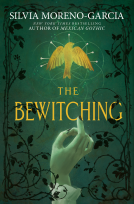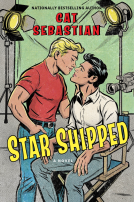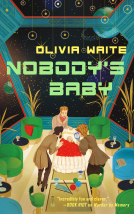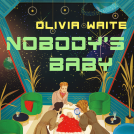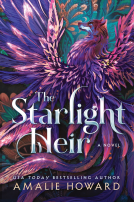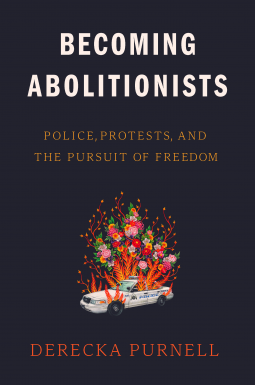
Becoming Abolitionists
Police, Protests, and the Pursuit of Freedom
by Derecka Purnell
This title was previously available on NetGalley and is now archived.
Send NetGalley books directly to your Kindle or Kindle app
1
To read on a Kindle or Kindle app, please add kindle@netgalley.com as an approved email address to receive files in your Amazon account. Click here for step-by-step instructions.
2
Also find your Kindle email address within your Amazon account, and enter it here.
Pub Date Oct 05 2021 | Archive Date Sep 28 2021
Astra Publishing House | Astra House
Talking about this book? Use #BecomingAbolitionists #NetGalley. More hashtag tips!
Description
Named a Kirkus Reviews "Best Book of 2021"
"Becoming Abolitionists is ultimately about the importance of asking questions and our ability to create answers. And in the end, Purnell makes it clear that abolition is a labor of love—one that we can accomplish together if only we decide to."
—Nia Evans, Boston Review
For more than a century, activists in the United States have tried to reform the police. From community policing initiatives to increasing diversity, none of it has stopped the police from killing about three people a day. Millions of people continue to protest police violence because these "solutions" do not match the problem: the police cannot be reformed.
In Becoming Abolitionists, Purnell draws from her experiences as a lawyer, writer, and organizer initially skeptical about police abolition. She saw too much sexual violence and buried too many friends to consider getting rid of police in her hometown of St. Louis, let alone the nation. But the police were a placebo. Calling them felt like something, and something feels like everything when the other option seems like nothing.
Purnell details how multi-racial social movements rooted in rebellion, risk-taking, and revolutionary love pushed her and a generation of activists toward abolition. The book travels across geography and time, and offers lessons that activists have learned from Ferguson to South Africa, from Reconstruction to contemporary protests against police shootings.
Here, Purnell argues that police can not be reformed and invites readers to envision new systems that work to address the root causes of violence. Becoming Abolitionists shows that abolition is not solely about getting rid of police, but a commitment to create and support different answers to the problem of harm in society, and, most excitingly, an opportunity to reduce and eliminate harm in the first place.
Advance Praise
"With deep insight and moral clarity, Purnell shares her compelling journey of political education and personal transformation, inviting us not only to imagine a world without police, but to muster the courage to fight for the more just world we know is possible. Becoming Abolitionists is essential reading for our times."
— Michelle Alexander, bestselling author of The New Jim Crow
"Becoming Abolitionists is part memoir & part manifesto for our times. Beautifully written, the book takes the reader on a personal journey from the Midwest to South Africa with a pit stop in New England. As a member of the ‘Trayvon Generation,’ Derecka offers us invaluable insights into how young activists are navigating and challenging current injustices. If you’ve been curious about the modern abolitionist movement, this book is a must read!"
— Mariame Kaba, bestselling author of We Do This Til We Free Us
"At once specific and sweeping, practical and visionary, Becoming Abolitionists is a triumph of political imagination and a tremendous gift to all movements struggling towards liberation. Do not miss its brilliance!"
— Naomi Klein, bestselling author of The Shock Doctrine and This Changes Everything
"Derecka Purnell has one of the most exciting minds of a generation, and Becoming Abolitionists gives us all an excuse to praise her. This book is an explosion of deep intellect matched with great love, showing a journey toward radical politics that embraces the messiness. Derecka does not expect we all wake up and become abolitionists immediately--it didn't happen that way for her--but by showing both her intellectual and emotional path toward abolitionist thinking, she provides a roadmap that is also compassionate to those moving in a slower lane. But with an argument rooted in history, criticism guided by deep care, and writing that pulses with urgency, Becoming Abolitionists will convince you that is exactly what we all need to do before you even put the book down."
— Mychal Denzel Smith, bestselling author of Invisible Man Got The Whole World Watching and Stakes Is High
"Derecka Purnell's writing is freeing and draws you. Becoming Abolitionists is a beautiful invitation to understand what is possible if we commit to unlearning our dependence on police and address the underlying injustices that cause harm in our communities. This is the book we have been waiting for and knew we needed to advance abolitionist efforts. Purnell is the abolitionist writer of her generation."
— Bettina Love, author of Abolitionist Teaching
"One of the most perceptive and passionate thinkers of any generation, Derecka Purnell, has written a genuinely revolutionary text for our times—one that resists easy answers or solutions and never shies from the hard questions. She proves that abolition is not an event or a utopian dreamstate, but rather a journey of assembly struggling to create new worlds of freedom as we fight the unfree world we inhabit. Beautifully written, passionate, honest, Becoming Abolitionists charts a journey we all must take if we plan to survive, let alone live together."
— Robin D.G. Kelley, author of Freedom Dreams: The Black Radical Imagination
“With the elegant prose of a gifted storyteller, the acumen of a seasoned organizer, and the sharp-edged wit of a radical legal scholar, Purnell takes us on the powerful journey to police abolition in her new book, Becoming Abolitionists. It is a must read for anyone serious about understanding this moment, and the ongoing Black freedom movement.”
— Barbara Ransby author of Ella Baker and the Black Freedom Movement
"In this moving and mind-expanding meditation on the nature and possibility of justice, Derecka Purnell—a self-professed member of the 'Trayvon generation'—traces her personal journey from her hometown of Saint Louis, Missouri to the frontlines of a global movement against racism and police brutality. A true philosopher, Purnell gleans wisdom at every opportunity, studying and struggling whether she’s in a law school seminar or protesting in the street, in a courtroom defending a client or visiting a nail salon. Being radical, this wonderful book reminds us, doesn’t mean having all of the answers—it means constantly questioning, listening, learning, and being willing to reassess and grow. Becoming Abolitionists brilliantly lays out the connections between policing and other forms of oppression and shows why even well-meaning “reforms” won’t get us where we need to go. This profound, urgent, beautiful, and necessary book is an invitation to imagine and organize for a less violent and more liberatory world. Everyone should read it."
— Astra Taylor, author of Democracy May Not Exist but We’ll Miss It When It’s Gone
"For those skeptics of abolition, this brilliant, revolutionary book will take you on a breathtaking journey to the other side. As Derecka makes clear, abolition is not just about firing cops and closing prisons; it’s about eliminating the reasons people think they need them. If you read any book this year – read this. It's a radiant and practical blueprint for the new world."
— V (formerly Eve Ensler) author of The Vagina Monologues and The Apology
"Becoming Abolitionists is a vital resource for anyone committed to the struggle for social justice, written by one of the sharpest and most inspiring voices to emerge in a generation. Taking readers on a journey from her childhood in St. Louis to the protests in Ferguson, the halls of Harvard, the streets of Soweto and beyond, Derecka Purnell’s heart-rendering analysis gives us the tools to envision a new society with endless possibilities. Even more, Purnell’s extraordinary blend of personal memoir, history, and critical theory provides a roadmap to build a safer and more just world. Like the Autobiography of Angela Davis, Becoming Abolitionists is sure to remain an essential text for decades to come."
— Elizabeth Hinton, author of America on Fire and From the War on Poverty to the War on Crime
"An extraordinary, wonderful, insightful, and immensely generative book that makes the case for abolitionist thinking, amplifying the self-activity of the masses already in motion, and at the same time providing a thoroughly absorbing and captivating description of the author's own journey. Rather than encouraging each of us to brand ourselves as radical, Purnell points us toward the collaborative acts of co-creation and accompaniment that can make revolutionary change possible. She incorporates decoloniality, feminism, Indigeneity, environmental justice, and disability activism organically into her critiques and solutions. One of the most exciting, inspiring, and enlightening books I have read in a long time."
— George Lipsitz, author of The Possessive Investment in Whiteness
"Derecka's book provides a front row seat to how a generation of young people have been radicalized by a series of contradictions living within the heart of global empire: the United States. She explains, with powerful stories and brilliant analysis, how she has committed herself to abolition in the context of ongoing collective study and struggle. The abolition she discusses is anti-capitalist and anti-colonialist, committed to racial, economic, and gender justice. A call to not simply tear down prisons and police, but to build a society where our collective needs prevail over profit and punishment. This book is more than a front row seat, it is an invitation to join the most important movement of our time."
— Amna Akbar, Professor of Law, The Ohio State University
"Purnell is undoubtedly one of the most important writers and activists of our generation, offering us a vivid, moving and compelling book for anyone interested in one of the most urgent issues of our times. Purnell weaves experiences of racism and resistance to articulate a blistering critique of racial capitalism, state power and imperialism, taking readers on a journey towards the radical alternatives to police and prisons which have shaped Black political movements in the 21st century."
— Adam Elliott-Cooper, author of Black Resistance to British Policing
Marketing Plan
Major national media campaign including print, radio, and online coverage
Pitch for feature stories and profiles, by-lined pieces, and op-eds
Author interviews on national radio, television, podcasts (NPR, PBS, NBC, CNN, ABC, HBO, etc)
National author tour including independent bookstores and festivals
Multi-month prepublication campaign on Astra House's socials
Highlight in Astra House newsletters and on website
Digital marketing/publicity campaign including features and reviews
Major awards submission campaign
Early outreach to influencers in activism, politics, and popular culture
Targeted outreach to organizations, media focused on police abolition, racial justice, women's issues
Bookseller outreach, focus on politically engaged and POC-owned bookstores
ARC giveaways on Goodreads and NetGalley
Library Marketing
Academic outreach: political & American studies, human rights, history, law schools
Targeted #Bookstagrammer outreach
Available Editions
| EDITION | Other Format |
| ISBN | 9781662600517 |
| PRICE | $28.00 (USD) |
| PAGES | 288 |
Average rating from 7 members
Featured Reviews
In her new book, Derecka Purnell, lawyer and activist, outlines a compassionate stance for abolition. Part memoir, part exposition, part action plan, this should be the next anti-racist book you pick up. Since George Floyd’s murder in 2020, you have probably seen or heard of protestors demanding to “Defund the Police.” Becoming Abolitionists provides background on the issues at hand like over-arrests, wellness checks that turn into raids, violence by police who are already trained to de-escalate and don’t. In many ways it picks up where Michelle Alexander’s The New Jim Crow leaves off from eleven years ago with more current events. It outlines the more public face of violence against Black people that we’ve seen since the murder of Michael Brown in Ferguson and Freddie Gray in Baltimore and also the more private face of the evictions of residents from low-income housing and police arresting residents on loitering charges while they hang out outdoors to escape the heat.
As an organizer, Purnell spends time one on one with people, often answering the questions “What about the murderers? What about the rapists?” She answers those questions here, both with statistics and with personal and public stories. She breaks down myths with discussions of bodily autonomy, explaining the damages to a community of prison sentences for drug related crimes, and even challenges the legal framework for determining criminality.
Purnell’s action plan is eminently rational and, more importantly I think, achievable. In her conclusion she outlines five major points for community engagement. Community accountability is also an easy phrase to throw around, but Purnell insists that reallocating resources to promote healthy communities will make a radical difference. For example, instead of the state spending money to put a child in foster care, redirect that money to community programs to help families and children flourish. The idea of abolition is not just to be anti-racist, but to promote supportive growth, well-rounded communities, and address concerns of the climate crisis on poor communities.
Most of all, what I loved best about this book is Purnell’s transparency about change and growth. As a young person, she and her family relied on the police for everything. They had to, because the police were their only option in an area devoid of healthcare, locksmiths, social workers and maintenance workers. But events and conversations over a lifetime lead to change, and she knows that even today this book is only a starting point and that her views will continue to adapt and evolve.
This one is important. It’s more than anti-racist. It’s an action plan to heal communities wrecked by violence, broken families, and climate change. I cannot recommend it enough, especially if you aren’t sure what abolition in our contemporary era could look like.
A must-read for anyone seeking to become more educated on the issues surrounding policing and prisons in the United States. Derecka Purnell expertly intertwines her own experiences with a policy evidence base building her case for abolition. **Thank you to NetGalley and the publisher for an ARC of this book in exchange for an honest review**
In her debut nonfiction book, Dereka Purnell, an organizer, lawyer & writer, offers a bold & provocative stance: Ending police and prison violence through an abolitionist framework. Purnell addresses this hot-button topic with historical assessment and her own activist experiences.
Purnell's passionate about her believes, but also honest about how they originated. What's refreshing about Purnell is how, through reading and experience, her own critical assessments of our country and its justice system have changed over time. While controversial, Purnell's beliefs are rooted in her own experiences on the ground in Ferguson, MI during the post-Michael-Brown protests and her extensive travel around the globe to learn how other countries address justice. She doesn't just say, "Don't do this," or "Let's end this." After discussing the history of police violence against Black people and their mass incarcerations, she also assesses how the "fixes" our government has implemented--police dept. reform (and its cost to taxpayers), the jailing of police (when it actually does happen), and use of body cameras--work..or don't. All in all her suggestions--and the process through which she came to them--are very detailed, supported, and intriguing. Her writing is conversational yet her passion for this subject absolutely comes through.
If you're interested in reading about bold ideas about and historical assessment of social justice issues, this book is a great resource.
 Reviewer 387294
Reviewer 387294
Having not read any books (or any lengthy articles) about abolition before, I found this book to be a great introduction to the idea. Purnell presents a strong argument for why abolition is a necessary mindset and tool for creating a better, more just, society. Her writing is very approachable, and I enjoyed how the first section of the book is really structured as a memoir and follows Purnell as she moves closer and closer to the idea of abolition in her life. There is a bit of a jump from more a memoirist approach to a manifesto around 35% of the way through, and that felt a bit jarring.
However, I think that if you have already read a lot about abolition, this book could prove to be a bit repetitive and lacking. Even as a beginner to this idea, I felt that the book started to get more and more repetitive as it goes on. A lot of the general underlying societal issues that Purnell points out are repeated throughout each section, often using similar phrases that don't really add anything new to the argument. I understand that these issues inform almost every aspect of how our society functions (or not functions), but I thought the repetitive phrases didn't really add anything or deepen my understanding that much.
I also think that the structure of this book is a bit confusing. While there are sections that focus on different topics, I felt that within each section, the writing was rather disjointed and didn't connect the guiding topics together very well. Purnell jumps from story to story and from topic to topic very frequently, and there isn't a strong thread to tie it all together. I also felt that we were pulled away from some narratives/ideas too quickly, and I was left wanting more. It felt rather incomplete at times, which is unfortunate.
Generally, I think this book is a great introduction to the ideas of abolition and how it can be applied to activist work and our general lives now. I feel like this book was really written for a more commercial/wider audience, and thus doesn't delve as deep as I would have liked into certain topics. Even so, I did find it to be quite helpful, and I really enjoyed Purnell's voice and how she introduces readers to abolition. So I would definitely recommend this as a first book to read about the idea, before you dive into more complex writing!
Thank you to Astra House Books and Netgalley for the digital advanced copy!

